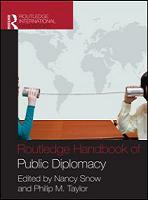Source: Routledge
 Although opposition to American foreign policy is particularly pronounced in the Arab-Muslim world, it has reached alarming levels even in those countries that America counts as its closest allies. Thus, in 2006, Anthony King, one of the world’s preeminent political scientists, observed that, "There has probably never been a time when America was held in such low esteem on this side of the Atlantic." How does this state of affairs impact American foreign policy? Joseph Nye has contributed greatly to the discourse on this question by introducing the notion of "soft power:" A nation wields soft power if it can convince others to support its objectives without having to employ force, economic sanctions, or other coercive instruments of statecraft. Extending Nye's concept, Ali Wyne examines how world public opinion influences the United States' ability to exercise influence abroad.
Although opposition to American foreign policy is particularly pronounced in the Arab-Muslim world, it has reached alarming levels even in those countries that America counts as its closest allies. Thus, in 2006, Anthony King, one of the world’s preeminent political scientists, observed that, "There has probably never been a time when America was held in such low esteem on this side of the Atlantic." How does this state of affairs impact American foreign policy? Joseph Nye has contributed greatly to the discourse on this question by introducing the notion of "soft power:" A nation wields soft power if it can convince others to support its objectives without having to employ force, economic sanctions, or other coercive instruments of statecraft. Extending Nye's concept, Ali Wyne examines how world public opinion influences the United States' ability to exercise influence abroad.
Please click here to read the rest of the chapter.
This book is available from Routledge.
To order the book from Routledge, please click here.
Ali Wyne is a Junior Fellow in the China Program.
